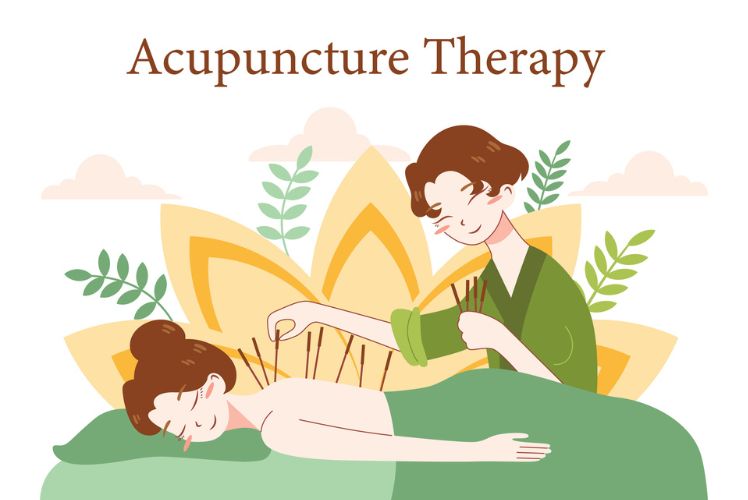Many of us want ways to improve our mental wellbeing that are safe and effective. Acupuncture, a traditional practice with a long history, is now being explored more for its possible benefits beyond physical health. Acupuncture may help some people find relief from stress, anxiety, and depression by promoting a sense of calm and balance in the body.
By targeting specific points, acupuncture can support both our physical and emotional health. Some mental health professionals have started to recommend it as part of a broader care plan, as it may help regulate key body systems connected to our mood and stress response. More people are considering acupuncture not just for pain, but also to support their mental wellbeing and overall quality of life.
Key Takeaways
- Acupuncture has historical roots and is now gaining attention for mental wellbeing.
- It may support overall mood and relief from stress and anxiety.
- Research is ongoing, but acupuncture is being used alongside standard mental health care.
Understanding Acupuncture and Its Historical Context
Acupuncture is a treatment that began over 2,000 years ago in China and remains popular worldwide. It draws from traditional ideas about health but has also been studied in modern medicine.
Foundations of Traditional Chinese Medicine
Traditional Chinese Medicine (TCM) is based on a holistic view of health. It sees the body as an interconnected system where physical and mental health are tied together. TCM believes that balance within the body and harmony with the environment are key for good health.
Acupuncture, herbal medicine, massage (tuina), exercise (qigong), and dietary therapy are main pillars of TCM. In TCM, disease is often seen as an imbalance or disruption in the body's natural order. Practitioners use fine needles in acupuncture to try and restore this balance.
Many TCM concepts may seem unfamiliar from a Western perspective, but they form the framework for practices that have lasted centuries. Acupuncture is one important part of TCM.
Role of Qi and Acupoints in Healing
In TCM, “qi” (pronounced "chee") is described as a life force or energy that flows through our bodies along pathways called meridians. Keeping qi flowing smoothly is considered essential for health. If qi is blocked or out of balance, health problems may occur.
Acupuncture targets specific points on the body called acupoints. By inserting thin, sterile needles at these points, practitioners aim to stimulate the flow of qi. Each acupoint has a specific location and function within the network of meridians.
These acupoints are believed to influence different organs and systems in the body. Although research continues into exactly how acupuncture affects the body, many people use it for a range of conditions, including those that impact mental wellbeing. The NHS explains how fine needles are inserted at precise sites to achieve intended effects.
Evolution of Western and Eastern Approaches
Western medicine approaches acupuncture differently than TCM. Instead of focusing on qi, most Western researchers examine acupuncture through anatomy, physiology, and clinical trials. They study how needles might affect nerves, muscles, and brain activity.
Acupuncture began gaining attention in the West in the 20th century. Clinics and hospitals started offering it as a complementary treatment for pain, stress, and other conditions. Some researchers suggest that acupuncture can trigger the release of natural chemicals in the body that may help with pain relief and relaxation.
Both Chinese and Western perspectives continue to shape acupuncture practice today. The blending of Eastern traditions and Western science helps us understand its potential benefits for physical and mental health.
How Acupuncture Impacts Mental Wellbeing
Acupuncture offers several ways to help us feel better mentally. It can reduce stress responses in our bodies, affect important brain chemicals, and help balance mood.
Mechanisms in the Nervous and Central Nervous Systems
Acupuncture interacts directly with our nervous system, including both the peripheral and central nervous systems. The insertion of fine needles stimulates nerve endings and signals travel through pathways to the brain. This process can lower the body's overall stress response.
Research suggests acupuncture can reduce the release of stress hormones like cortisol. As a result, people may feel calmer and experience fewer symptoms of anxiety or tension. By calming the nervous system, acupuncture helps our bodies become more relaxed and balanced. For more information, see how acupuncture activates the body's relaxation response.
Influence on Neurotransmitters and Neurohormones
Acupuncture affects the levels and action of neurotransmitters such as dopamine, endorphins, and norepinephrine. These chemicals play a role in emotions, motivation, and our ability to handle stress.
Stimulation from acupuncture can increase the production of endorphins, which are natural painkillers and mood boosters. This leads us to feel greater calm and well-being. Acupuncture may also affect hormones like cortisol and adrenaline, which are part of the “fight or flight” response. By regulating these neurohormones, acupuncture helps manage feelings of stress and supports mental health. To learn more, you can refer to how acupuncture promotes emotional health and relieves stress.
Changes in Serotonin and Emotional Balance
Serotonin is a neurotransmitter important for mood, sleep, and emotional balance. Low levels of serotonin are linked to depression and anxiety. Acupuncture may raise serotonin levels by influencing its release in the brain.
Some studies report improvements in mood and reduced symptoms of anxiety following acupuncture treatments. By helping to steady serotonin, acupuncture supports better sleep patterns and a calmer mind. It also helps us manage daily challenges with greater ease. This is one way acupuncture supports mental wellbeing and relaxation.
Acupuncture as a Treatment for Mental Health Conditions
Acupuncture is often used as a complementary approach for different mental health problems like depression, anxiety, stress, insomnia, and fatigue. Many people seek this treatment to help relieve both emotional and physical symptoms that traditional therapies may not fully address.
Managing Depression and Major Depressive Disorder
For people living with depression or major depressive disorder, daily life can feel overwhelming. Symptoms often include persistent sadness, lack of motivation, and physical tension.
By inserting fine needles into specific points, acupuncture aims to help balance chemicals in the brain related to mood. Several studies show that this method can provide benefit when used alongside other treatments, such as counselling or medication. With acupuncture, patients often report feeling calmer and more relaxed after sessions.
We notice that it may not work for everyone, but it can offer extra support for those looking for more natural relief. For some, it can lessen the intensity of depressive episodes, making symptoms more manageable over time.
Reducing Anxiety and Stress
Anxiety and stress affect both our mental and physical health. People might experience worry, irritability, sleep trouble, or even headaches and muscle pain.
Acupuncture has become a popular option for reducing anxiety and stress. Research highlights its ability to help calm the mind, soothe nerves, and ease physical tension. According to the NHS, the treatment involves placing very thin needles at certain points on the body, which can stimulate the production of feel-good chemicals.
Many of us attend regular sessions to keep symptoms in check and enjoy a greater sense of balance and relaxation. Acupuncture may be used alongside or instead of conventional stress management methods, providing additional options for those struggling with mental health problems.
Relief for Insomnia and Fatigue
Long-term insomnia and fatigue can harm our mood, focus, and overall wellbeing. People may find it hard to fall or stay asleep, feel tired during the day, or have low energy.
Acupuncture may help by promoting relaxation and regulating our body’s natural sleep rhythm. People report falling asleep more easily and feeling less drained after a series of treatments. Some sessions focus on points linked to better sleep and increased energy.
As a non-drug option, acupuncture appeals to those who want to avoid medication or who have not found relief with sleep aids. It is often used together with other methods, such as changes in lifestyle and sleep routines.
Addressing Bipolar Disorder and Depressive Episodes
Living with bipolar disorder means dealing with both highs and lows in mood. The depressive episodes can be particularly hard, marked by deep sadness, lack of interest, and tiredness.
Although acupuncture is not a primary treatment for bipolar disorder, it may serve as a helpful complement, especially for the depressive phases. Some people find that it helps to reduce stress, balance mood, and support overall mental health when used alongside medications and therapy. Sessions target specific points to manage symptoms like anxiety and improve general wellbeing.
While evidence is still limited, those using acupuncture for bipolar disorder’s depressive episodes sometimes report better mood stability and reduced tension. It offers an additional option under the care of a mental health professional.
Supporting Wellbeing and Quality of Life
Acupuncture can support our response to stress, energy levels, and sense of health. It may also play a role in easing physical discomfort and encouraging positive lifestyle habits.
Improvements in Health-Related Quality of Life
Research shows that acupuncture has a positive impact on our health-related quality of life. For many people, it can reduce feelings of anxiety or sadness while also helping us feel more balanced day to day.
By influencing the body’s nervous system, acupuncture may ease tension and promote relaxation. This resetting helps us cope better with stress and sleep more soundly.
Clinical studies suggest acupuncture can support emotional wellbeing by regulating hormones. When we feel better emotionally, it’s easier to stay motivated at work and enjoy our relationships. For more on this topic, see how acupuncture may help with enhancing mental health and wellbeing.
Alleviation of Physical Symptoms and Pain Relief
Pain relief is one of the most common reasons people try acupuncture. Evidence suggests acupuncture can help with headaches, back pain, muscle aches, and discomfort from chronic conditions.
Using thin needles at precise points, the treatment may ease our physical symptoms by encouraging the body to release endorphins and reduce inflammation. This can lead to less pain and greater comfort during daily activities.
When pain lessens, our moods and energy levels often improve as well. Activities like light exercise or a walk become possible again, which has added benefits for our wellbeing. Guidelines from the NHS have identified acupuncture as a helpful tool for managing pain and physical symptoms.
Natural Healing Approaches and Lifestyle Factors
Acupuncture is part of a broader approach to natural healing that considers the body as a whole. Treatments are often paired with recommendations for gentle exercise, relaxation, and good nutrition.
By restoring balance to the body’s energy, acupuncture may help regulate stress hormones and calm our nervous system. People often notice a greater sense of calm and resilience after a session, making healthy habits easier to maintain.
Some clinics encourage us to combine acupuncture with healthy lifestyle choices. Small changes, like paying attention to sleep routines and including light exercise, may support long-term wellbeing. Read more about how acupuncture works alongside lifestyle changes for better emotional health.
Practices, Safety, and Integrating Acupuncture With Mental Health Care
Acupuncture is increasingly being considered as part of comprehensive mental health care. Understanding its practices, safety profile, and the way it fits with other treatments can help us make informed decisions about our options.
Role of the Acupuncturist and Treatment Approaches
An acupuncturist is a trained healthcare professional who uses fine needles to stimulate specific points on the body. Sessions typically last 30 to 60 minutes. The acupuncturist takes our medical history and assesses our symptoms before developing a tailored treatment plan.
Different approaches are used depending on our mental health needs. For depression and anxiety, certain points may be targeted to balance energy and support emotional wellbeing. Integrating acupuncture with usual care has shown some promise for improving mental health, especially in combination with other approaches like talking therapies. Details about the effectiveness of integrating acupuncture for mental health conditions can be found in studies such as those cited on PubMed Central.
We must ensure our acupuncturist is fully qualified and properly trained. In the UK, practitioners who are members of the British Acupuncture Council follow strict standards and guidelines for safe practice.
Safety, Side Effects, and Use With Other Therapies
When practised by a qualified acupuncturist, acupuncture is generally safe for most people. Common side effects are mild and include slight bruising, minor bleeding, or tenderness at needle sites. Reports of serious side effects are rare, especially when clean, single-use needles are used.
It is important that we inform our healthcare providers about all therapies we are using, including acupuncture, especially if we are also taking medications like antidepressants. Acupuncture can often be used alongside counselling, medication, or psychotherapy without negative interactions. We should consult our GP or psychiatrist before beginning acupuncture, particularly if we have underlying health conditions or are on multiple prescriptions.
Guidelines suggest that integrated care, where acupuncture is part of a broader mental health support plan, increases both safety and the likelihood of positive outcomes. More information about safe practice is available in the integrated mental health guidelines.
Collaboration With Psychotherapy and Counselling
Combining acupuncture with psychotherapy and counselling is becoming more common. Integrating these approaches can offer more complete support for individuals with anxiety, depression, or emotional distress. Acupuncture may help reduce symptoms, allowing us to engage more deeply in counselling or talking therapies.
Practical steps for integration include regular communication between our acupuncturist and mental health professionals. Sharing updates and progress allows both teams to adjust their approaches to fit our changing needs. We may benefit from a treatment plan that includes a mix of acupuncture sessions and regular psychotherapy appointments.
According to recent research, combining acupuncture with usual care may have benefits for mental health symptom management and emotional wellbeing. Details on this integration are explored by mental health clinics such as in this practice summary.
Addressing Stigma Around Acupuncture
Stigma can be a real barrier when considering acupuncture for mental health. Some people worry it's not a "real" treatment or fear being judged for choosing something outside typical Western medicine. These thoughts can make us hesitant to try or talk about acupuncture.
Efforts to reduce stigma focus on education and open communication. Knowing that registered acupuncturists in the UK are subject to professional standards overseen by recognised bodies helps increase public trust. The British Acupuncture Council's scope includes mental health care, making acupuncture credible and accessible for people of all ages. More details are available through guidance from the UK Parliament Committees.
By sharing accurate information and positive experiences, we help others make informed choices without fear of judgement. Collaborating with mainstream healthcare services also helps acupuncture become a normal option for mental wellness.
Current Research and Evidence
Recent studies provide us with more insight into how acupuncture affects mental wellbeing. Results compare acupuncture to standard treatments and use control groups for clearer outcomes.
Clinical Trials and Control Groups
Many clinical trials have used control groups to determine if acupuncture truly helps with mental health. In these studies, some participants receive acupuncture while others get a placebo or no treatment.
Results indicate that people who received acupuncture often reported better mental wellbeing than those in control groups. For example, a study tested if acupuncture improved both mental and physical health in people with pain and mood symptoms.
Studies usually look at issues like depression, anxiety, and stress. They often find reduced symptoms, especially when acupuncture is combined with other therapies.
To ensure accuracy, researchers use random assignment and blinding when possible. This reduces bias and strengthens findings.
Comparisons With Western Treatments
We often see acupuncture compared to Western medicine for depression and anxiety. In some trials, acupuncture works about as well as some medicines for mild to moderate depression, though results can vary.
A review found that combining acupuncture with standard treatments can enhance results, especially for depression. This suggests it may be a useful option for some people.
However, not all studies find a big difference between acupuncture and usual psychological or drug treatments. Some experts say acupuncture can be used with other therapies, but it is not always a replacement for medical care.
The quality of evidence can differ across studies. Stronger research tends to show better outcomes, especially when studies are larger and use careful methods.
Frequently Asked Questions
Acupuncture is sometimes used alongside standard treatments for anxiety, depression, and stress-related concerns. Our focus here is on effects for mental health, where to find care, and what research shows. We also discuss acupuncture points and how this approach may work on emotions.
What are the reported benefits of acupuncture for managing anxiety and depression?
Many people seek acupuncture to help manage symptoms like low mood, tension, and worry. Some report feeling calmer, more relaxed, and able to handle stress better after treatment.
Smaller studies suggest acupuncture may ease anxiety and mild depression for certain people. However, results can vary depending on the individual and the severity of symptoms.
Can acupuncture have a positive impact on overall mental health?
Some users notice improvements in their sense of wellbeing, sleep, and daily functioning after regular acupuncture sessions. Others feel more balanced or able to cope with daily demands.
Evidence remains mixed, and acupuncture is often used as a complement to, not a replacement for, established therapies.
Where can one find reputable acupuncture services for mental wellbeing?
Accredited practitioners can be found through professional bodies such as the British Acupuncture Council. Many clinics list their practitioners' qualifications and areas of experience. We can search online directories or clinic websites to find specialists in mental health concerns.
For example, the British Acupuncture Council website provides lists of trained professionals and information about what to expect in a session.
What are some common acupuncture points associated with improving mental health?
Points often used include Yin Tang (located between the eyebrows), Shen Men (on the ear), and points along the Heart and Pericardium meridians. Practitioners may also use points on the hands, feet, or scalp, depending on individual needs.
The selection of points is tailored to each person's symptoms and constitution.
How does acupuncture influence emotional equilibrium?
Acupuncture is thought to promote relaxation by stimulating nerves and affecting brain chemistry. Some theories suggest it may help reduce stress hormones and encourage the release of endorphins.
Results differ, but many people describe feeling emotionally lighter or less tense after sessions.
What are the findings from systematic reviews and meta-analyses regarding acupuncture for depression?
Systematic reviews show mixed results. Some studies report that acupuncture can be helpful for mild to moderate depression, especially when combined with other treatments.
However, the quality of evidence varies, and more high-quality research is needed. Some reviews state that, while acupuncture appears safe and acceptable to many, it should not be considered a stand-alone treatment for severe depression.





















